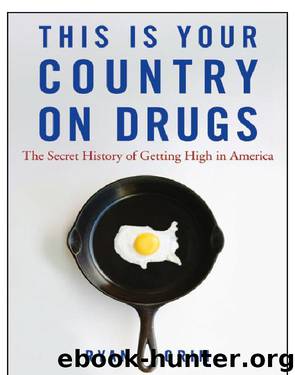This Is Your Country on Drugs by Ryan Grim

Author:Ryan Grim
Language: ru
Format: mobi, epub
Publisher: John Wiley & Sons, Ltd.
Published: 2010-05-10T20:00:00+00:00
Whatever the political climate, weed consumption is typically a social act: someone’s got a bag, leading some friends to get together somewhere discreet, sneak a few puffs, drop in some Visine, and head back home. The ritual can be as much about exploring boundaries with friends as it is about getting high.
To smoke together, kids need free time, preferably right after school lets out, when the grown-ups are still at work and the world belongs to the young. That window of opportunity, however, is getting smaller. Psychiatrists Alvin Rosenfeld and Nicole Wise wrote about this trend in their book Hyper-Parenting: Are You Hurting Your Child by Trying Too Hard?, published in 2000. The book suggests that as more women have entered the workforce, and as the number of hours we all work continues to increase, parents have turned to schools, churches, and other local organizations to do some of their parenting for them. Rosenfeld found that over the past twenty years, “ structured sports time” has doubled and “unstructured children’s activities” have declined by 50 percent among children in all socioeconomic groups. It’s probably not a coincidence that as kids have had less time to smoke pot, they’ve smoked less pot.
I asked Rosenfeld if he believes that overscheduling could diminish teen drug use. He didn’t think so. In an e-mail, he wrote:
I have no idea why use has declined . . . but I suspect that the connection is far more complex. Athletes use more alcohol than other students and they often are the most highly scheduled. Why is that the case if scheduled activities cause less substance abuse?
As a child psychiatrist, I consider psychology—and the family dynamics from which it emerges—the crucial issue. What makes one kid smoke pot and the other say no thanks? What makes one kid get involved in after school programs and makes the other drop out? What makes one kid play French horn and the other become a tackle? As to socialization, I would suspect (with little objective evidence) that teenagers who have one best buddy are less likely to use drugs; those who feel angrier, more depressed and anxious, isolated and socially awkward might be more prone. Furthermore, I think any teenager can make an opportunity if they really want to—motivation is at least as important as opportunity.
The assumption that teenagers who use drugs all do so to escape their misery—or because they are “depressed and anxious, isolated and socially awkward,” or, as Kaplan suggests, because they’ re compensating for some perceived failing to live up to conventional values—is rooted in a rather simplistic understanding of young people. Kids, first of all, are not all the same. Some are natural conformers and/ or achievers and some will rebel no matter what and some are everywhere in between. The notion that only kids who are messed up in some way use drugs isn’t supported by the research. In a chapter in the 1987 book Drug Use and Psychology, teen-drug-use researcher Michael Newcomb wrote that
Download
This site does not store any files on its server. We only index and link to content provided by other sites. Please contact the content providers to delete copyright contents if any and email us, we'll remove relevant links or contents immediately.
The Hacking of the American Mind by Robert H. Lustig(4342)
Right Here, Right Now by Georgia Beers(4171)
Fingerprints of the Gods by Graham Hancock(3966)
Goodbye Paradise(3767)
Bad Pharma by Ben Goldacre(3399)
Happiness by Matthieu Ricard(3024)
More Language of Letting Go: 366 New Daily Meditations by Melody Beattie(3005)
The Social Psychology of Inequality by Unknown(2990)
The Plant Paradox by Dr. Steven R. Gundry M.D(2583)
Drugs Unlimited by Mike Power(2566)
Confessions of a Shopaholic by Sophie Kinsella(2313)
Borders by unknow(2283)
Make Love Not Porn by Cindy Gallop(2082)
Dry by Augusten Burroughs(2075)
Stop Being Mean to Yourself: A Story About Finding the True Meaning of Self-Love by Melody Beattie(1965)
Getting Off by Erica Garza(1913)
Belonging by Unknown(1839)
Yoga and the Twelve-Step Path by Kyczy Hawk(1811)
Unmasking Male Depression by Archibald D. Hart(1783)
